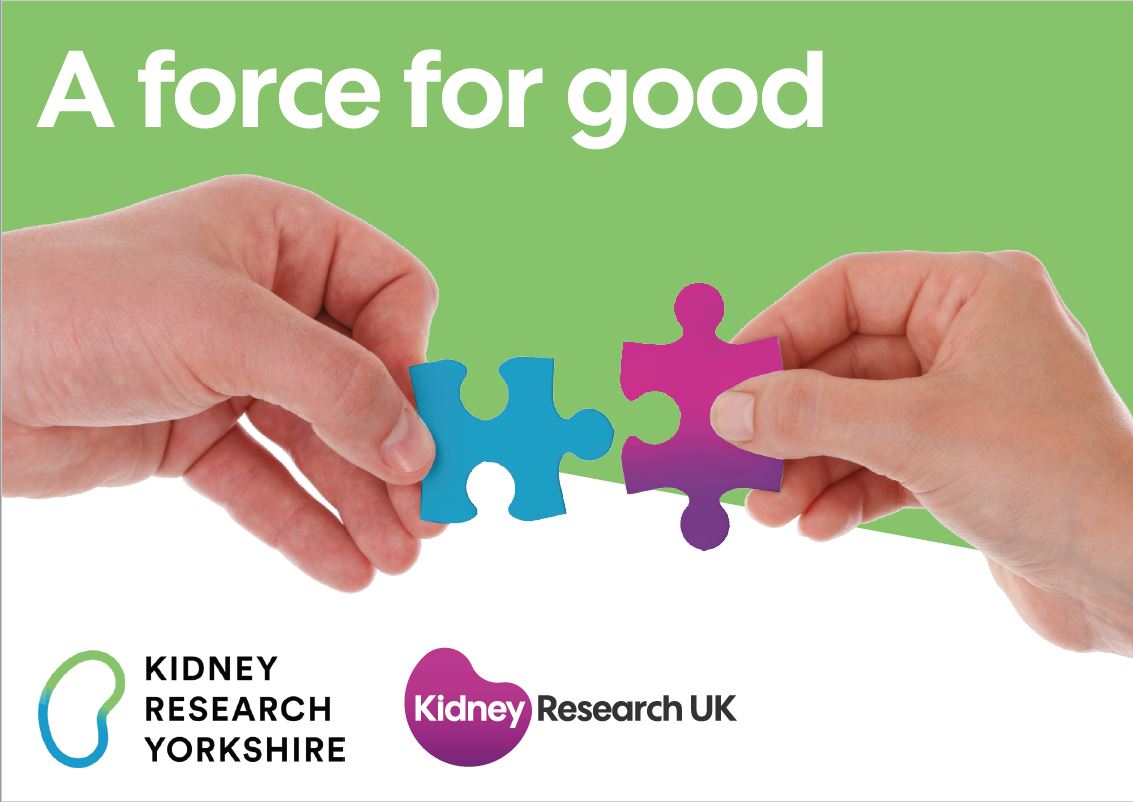Yorkshire kidney patient Jermaine Jones can’t wait for two exciting research projects taking place on his doorstep. Two joint awards totalling £475,000 from Kidney Research UK and Kidney Research Yorkshire have been given to researchers at the University of Leeds and are due to commence later this year. We’re combining our efforts to accelerate the fight against kidney disease.
Supporting patients like Jermaine
Jermaine was just 37 when his kidney journey began. One day he woke up with what felt like a horrible hangover. Over the next two weeks, Jermaine was constantly thirsty and started to notice that he was passing urine at a much faster rate than usual. After getting his blood tested at the doctor, Jermaine was given the shocking news that his kidneys had failed.

In November 2022, Jermaine was able to receive a transplant through the kidney donor share scheme. Whilst not a direct match to Jermaine, his friend Ben Howley was able to donate his healthy kidney to a complete stranger to allow Jermaine to receive one in return.
“I am really excited whenever I see a new piece of research being funded, particularly if it’s taking place on my doorstep as I know that new discoveries could help to improve my life. “ Jermaine Jones
About the research
The two teams, led by Professor Andrew Macdonald and Professor Colin A Johnson, will conduct their work at the University of Leeds with the hope of discoveries emerging in the next three years.
Andrew’s work will look at how viral infections in transplant patients can be managed. Kidney transplant recipients have to take immunosuppressant medications to ensure that their new organ is not rejected by their immune system, but this makes them more susceptible to viral infections. The BK virus is common and not harmful in most people, but for transplant patients, it can be particularly dangerous. It can potentially damage the transplanted organ, sometimes leading to it being rejected by the body.
The team will look specifically at a gene known as CFTR and the role it plays in BK virus infection. If Andrew and his team can find new approaches to manage this virus, it would prevent kidney transplant patients from often having to reduce their immunosuppressant medications following infection.
Colin’s work will look to see whether a technique known as ‘exon skipping’ can be used in conditions such a polycystic kidney disease (PKD). In PKD cysts form on the kidneys, which can impair their function and lead to kidney failure. The team will study specific structures that form on the surface of kidney cells known as cilia and their role in PKD.
Colin and his team will look at whether telling certain cells to skip the part of the genetic code that has been mutated could help treat PKD and develop healthy cells. Exon skipping has already been used in genetic disorders such as Duchenne muscular dystrophy and spinal muscular atrophy. If the team are successful, it could open up new avenues for future treatments.
Elaine Davies, director of research operations at Kidney Research UK, said: “Working in partnership with Kidney Research Yorkshire has helped us to expand the scope of our funding capabilities and support these two exciting projects in Leeds. If successful, the two research projects could be the foundation of future treatments that will greatly impact the kidney community in Yorkshire and beyond. Despite the ongoing challenge of the cost-of-living crisis, we remain fully committed to funding life-changing research that can be translated into real-world benefits for kidney patients.”
Julian Wiley, chair of trustees at Kidney Research Yorkshire said: “We are delighted to have the opportunity to work with Kidney Research UK. As a local charity, it is important for us to maximise the impact that the funds our supporters raise for us has. By co-funding projects with Kidney Research UK, we are able to do just that by ensuring that these important research projects receive the funding necessary to go ahead. We are very excited about this partnership and look forward to working together on more opportunities in the future to help us achieve our aim of developing Leeds as a vital hub for renal research.”
Jermaine is excited to see what comes next: “Kidney Research UK and Kidney Research Yorkshire do a fantastic job in generating funds to raise awareness and assist with funding research. Without their help, I’m sure I wouldn’t be in the situation I am now.”

The funded projects will all commence in 2023 and run continuously over the next three years.

